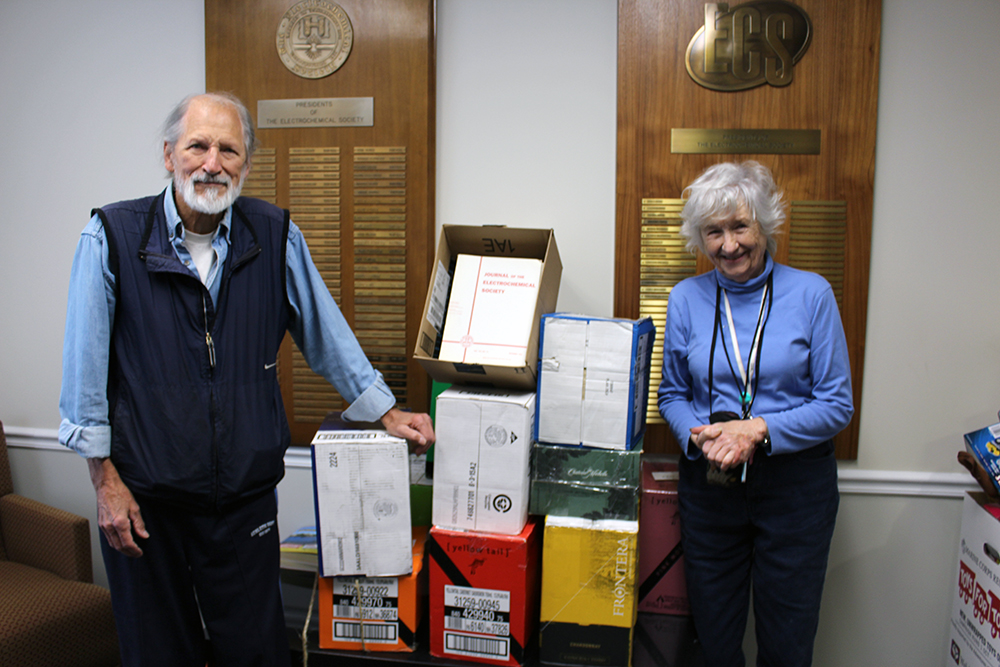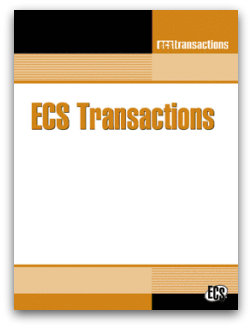 Janine Mauzeroll is an associate professor at McGill University, where she leads a research group focused on topics ranging from electrochemistry in organic and biological media to electronically-conducting polymers. Her work combines experimental and theoretical electrochemical methods and applies them to biomedical and industrial problems such as multidrug resistance in human cancer cells, neurotransmitter release, biosensor design, and high-speed scanning electrochemical microscopy. Mauzeroll has recently been named a new technical editor of the Journal of The Electrochemical Society, concentrating in the Organic & Bioelectrochemistry Topical Interest Area.
Janine Mauzeroll is an associate professor at McGill University, where she leads a research group focused on topics ranging from electrochemistry in organic and biological media to electronically-conducting polymers. Her work combines experimental and theoretical electrochemical methods and applies them to biomedical and industrial problems such as multidrug resistance in human cancer cells, neurotransmitter release, biosensor design, and high-speed scanning electrochemical microscopy. Mauzeroll has recently been named a new technical editor of the Journal of The Electrochemical Society, concentrating in the Organic & Bioelectrochemistry Topical Interest Area.
What do you hope to accomplish in your role as Technical Editor?
I see no greater need than the one related to the promotion of fundamental research as a necessary partner to applied and industry driven science. As Technical Editor, I will put emphasis on complete experimental and full disclosures to generate “go to” manuscripts.
Moving forward, I hope to convince established researchers to continue sending in manuscripts by offering them visibility, such as special issues in or keynote addresses at symposiums. We need to seek out new researchers and deliver on our promise to provide a respectful and efficient review.
How has the rise of open access changed the current scholarly publishing model?
The rise of open access is a game changer and step forward for science. Strongly influenced by funding agencies, who have financed the publishing costs related to figures, covers and, general publishing costs, it is now a requirement in several countries that all publicly funded research be open access. In removing this budgetary constraints, we promote a publishing model focused on a desired target audience and impact.
Additionally, ECS’s Free the Science initiative will lead to a more general access to reliable and good scientific information, which is a basic requirement for further innovation and discoveries. In removing these constraints, more resources are being diverted to supporting the pillars of our research: students and fellows. Knowledge sharing basically forces us to move away from our protectionism inclinations and focus on our next great idea.
(more…)



 The National Inventors Hall of Fame was founded in 1973 and continues to honor individuals among us who strive to make the world a better place through innovation. With a simple mission to recognize inventors and invention, the National Inventors Hall of Fame announces a call for nominations for 2017 recognition.
The National Inventors Hall of Fame was founded in 1973 and continues to honor individuals among us who strive to make the world a better place through innovation. With a simple mission to recognize inventors and invention, the National Inventors Hall of Fame announces a call for nominations for 2017 recognition.
 Truth seems to be an increasingly flexible concept in politics. At least that’s the impression the Oxford English Dictionary gave recently, as it declared “post-truth” the
Truth seems to be an increasingly flexible concept in politics. At least that’s the impression the Oxford English Dictionary gave recently, as it declared “post-truth” the 
 Nature announced on December 8
Nature announced on December 8 Lithium-ion batteries supply billions of portable devices with energy. While current Li-ion battery designs may be sufficient for applications such as smartphones and tablets, the rise of electric vehicles and power storage systems demands new battery technology with new electrode materials and electrolytes.
Lithium-ion batteries supply billions of portable devices with energy. While current Li-ion battery designs may be sufficient for applications such as smartphones and tablets, the rise of electric vehicles and power storage systems demands new battery technology with new electrode materials and electrolytes. Janine Mauzeroll is an associate professor at McGill University, where she leads a research group focused on topics ranging from electrochemistry in organic and biological media to electronically-conducting polymers. Her work combines experimental and theoretical electrochemical methods and applies them to biomedical and industrial problems such as multidrug resistance in human cancer cells, neurotransmitter release, biosensor design, and high-speed scanning electrochemical microscopy. Mauzeroll has recently been named a new technical editor of the
Janine Mauzeroll is an associate professor at McGill University, where she leads a research group focused on topics ranging from electrochemistry in organic and biological media to electronically-conducting polymers. Her work combines experimental and theoretical electrochemical methods and applies them to biomedical and industrial problems such as multidrug resistance in human cancer cells, neurotransmitter release, biosensor design, and high-speed scanning electrochemical microscopy. Mauzeroll has recently been named a new technical editor of the  Water and energy are inextricably linked. The two have shared a long technological and symbolic connection, which has led to what researchers in the field call the energy/water nexus.
Water and energy are inextricably linked. The two have shared a long technological and symbolic connection, which has led to what researchers in the field call the energy/water nexus.